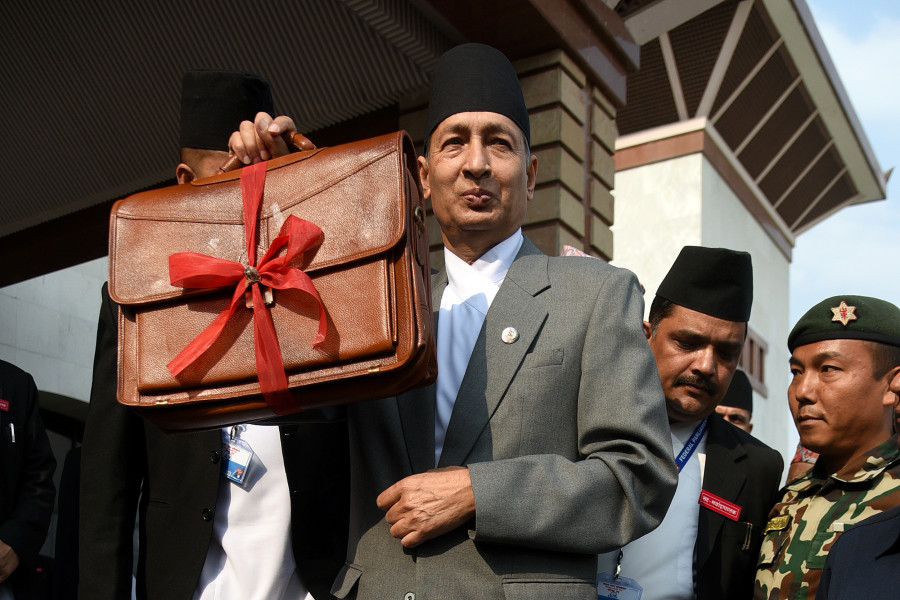Money
Government should widen tax base and strengthen tax administration, analysts say
They lay emphasis on putting in place sustainable and broad-based systems rather than ad hoc measures
Rajesh Khanal
Revenue generation is a perennial problem the government has to deal with, and to make up for the shortfall, it often tends to resort to ad hoc measures. One of the major sources of revenue is tax and if the government can get it right, experts and analysts say, it can put development activities on a faster pace and reduce income inequality.
Just as Finance Minister Yubaraj Khatiwada prepares to present the budget for the fiscal year 2019/20, the analysts say the government should focus on putting in place sustainable and broad-based systems—expanding tax bases and strengthening the tax administration—to ensure they could deliver predictable revenues.
According to them, tax overburden, if imposed on the private sectors and salary earners, can reduce the aggregate demand, taking down economic activities, which will directly hit the annual economic growth.
Similarly, failure to meet the revenue target can lead to the rise in the budget deficit for which the government may have to depend excessively on the foreign borrowing to meet the state expenditure—a situation that could plunge the country into a debt trap.
In addition, it could give rise to serious resource crunch at a time when the government is aiming to expedite development activities.
Govind Nepal, who teaches economics at Tribhuvan University, said the government could enforce an integrated tax system to expand the tax bases.
“Single tax policy could help bring the informal economic activities to the tax bracket,” Nepal told the Post. Giving an example of the house rent tax, which is largely unimplemented at present, Nepal said the federal government’s budget could also make the sub-national governments more liable to collect such taxes at the grassroots level.
Almost every year, the government jacks up tax on products such as alcoholic beverages and tobacco products to raise revenue collection. Last year, the government heavily revised the excise duty on vehicles and the slab on income taxes.
But economists say these may help in generating revenue, but they are not the sustainable tools.
Chandan Sapkota, an economist who writes extensively on economy and finance, said the sensible tax regime is one of the key factors to drive a country’s economy.
“It is also helpful to create an enabling environment to promote the right kind of industries,” said Sapkota.
Sapkota laid stress on the need to reduce the tax rate while strengthening the tax administration to help bring individuals and businesses to operate their works via the formal channel.
A small tax is also a result of the informal nature of the economies, hence analysts say reducing individual and corporate taxes could encourage more people and business to operate formally, which will generate more tax in a systematic manner.
“Plugging the loopholes in tax collection measures, exempting tax on the import of industrial raw materials and making electronic billing system more effective are some of the measures the government can adopt to improve the tax regime,” said Sapkota.
Based on the ground, there is little room to alter the income tax slab and excise duty, said the analysts who stressed that the government needs to explore more areas where tax can be imposed in a sustainable and deliverable manner.
Ram Sharan Mahat, a former finance minister, said the government has little room to raise the tax rate in the upcoming budget. “As the tax rates were raised heavily in a number of sectors in this year’s budget, the government should focus on finding new sectors to impose the tax,” said Mahat.
Giving an example of the slow growth rate of manufacturing and service sectors this year, Mahat said high tax rates also affect the growth of the sub-sectors and it could also increase the chances of tax evasions.
According to officials of the Finance Ministry, the budget panel at the ministry has formed a separate mechanism to identify the potential areas to impose the tax.
“The government is seeking to bring businesses such as the realty sector, education consultancies, manpower companies, legal consultant services and media houses under the tax bracket via next year’s budget,” said an official on condition of anonymity because he was not authorised to speak with the media.
Of the government budget worth Rs1.31 trillion announced for the current fiscal year, it has aimed to raise Rs838 billion from tax collection.
Expansion of tax base of non-tax revenue, revision of tax rates, control of tax evasion and leakage through effective tax administration were among the targeted tools to meet the revenue target, reads the budget document of the government for the current fiscal year.
Implementing stringent tax policy at the customs points, imposing road tax based on the principle of road user pay, enforcing box office system with electronic ticketing for film distribution and implementing the central billing monitoring system for the large tax payers were among the government’s proposed tasks for effective tax collection.
Despite the announcement, the government has fallen short of the target this year.
The mid-term review of the annual budget in March lowered the target to Rs730 billion. But still, the government has been able to collect only Rs570 billion as tax revenue as of mid-May.
The Department of Customs attributed the shortfall in revenue collection to the fall in import of vehicles and construction materials, among others, with slow capital expenditure and high interest rate charged by banks.
The 10-month statistics of the department shows that the import revenue surged by 20 percent to Rs293.57 billion.
Rameshwor Dangal, director general of the department, said the rise in the customs revenue is not on par with the government target.
This year, the government has set the target to collect tax revenue 28 percent more than the amount of the last fiscal year, which experts say is a bit too ambitious.
In a bid to boost revenue, the government since mid-April has made personal account number mandatory for those investing more than Rs500,000 in stocks. Now, the government is considering imposing 7.5 to 10 percent capital gains tax on stock traders from the next budget announcement. In addition, social media platforms such as Facebook and Viber, among others, could be the new tax bases, said the source at the Finance Ministry.
Dipendra Bahadur Chhetri, former vice-chairman of the National Planning Commission, said the government should make the functioning of the tax authorities more effective and expand tax bases to generate more financial resources via tax collection.
“The budget needs to prioritise taxing the earnings of high-skilled professionals such as lawyers, doctors and engineers who are still out of the tax bracket in many cases,” he said




 9.7°C Kathmandu
9.7°C Kathmandu















